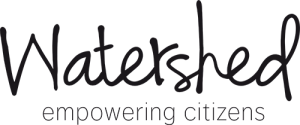The Theory of Change (ToC) has been developed by the Ghana Watershed team members in the ToC workshop together with key stakeholders from government agencies, NGOs and others. After the workshop, the ToC was refined by the Ghana Watershed team members. The ToC focuses on strengthening the capacities of both government agencies as well as CSOs. As suggested by the ToC facilitator Anita van der Laan, we mostly focused on outcomes. While working on the government and CSO strategies separately, we noted that these pathways are very much interlinked, so we connected these pathways where feasible. This can be seen in the diagram as well. While working on the ToC, we also realised we already included some activities. To guide the reader, we gave the different elements of the ToC different colours. The colour coding is as follows:
- Green = Watershed strategies
- Yellow = Outcomes related to the government
- Blue = Outcomes related to the CSOs
- Grey = Outcomes related to the private sector
- Pink = Activities
- Purple = Impact
After the workshop we had a very complex and extensive ToC with all the inputs from the stakeholders (see picture below). With the team we organized and narrowed down this complex ToC to a more workable ToC with various smaller pathways. This will help the team to select outcomes.

Revised ToC

Watershed Ghana Theory of Change narratives
Strategy 1: CSO engage with Government for improved planning, financing, and coordination for sustainable WASH and IWRM integration
| Intervention |
Outcome |
Outcome |
Outcome |
Outcome |
Assumptions |
| Establish media platforms to provide space for discussions with government officials |
Government officials participate in media platforms to produce WASH and IWRM information |
Citizens feed into government planning on WASH and IWRM |
Government includes citizen recommendations into planning and coordination |
Government implements plans for sustainable WASH and IWRM |
Government will be open for CSO contributions and participation
Government (Ministries and agencies) are capacitated and resourced to deliver on objectives and targets
District and national level government are transparent about the funds they spend and the results they achieve by making information available to CSOs and citizens
|
| Facilitate meetings with national and district level government to set up/ revamp platforms for dialogue between CSOs and Government |
Platforms for dialogue established / revamped by government to engage CSOs |
Platforms on WASH and IWRM coordinate and monitor the fulfilment of commitments |
CSOs engage government (National/District) for improvement of WASH and sustainable IWRM
|
Government improves coordination between sector agencies, DPs, private sector, CSOs and citizens
|
| Generate evidence on IWRM/WASH financing to engage national and district government |
CSOs disseminate/use evidence (budget tracking and finance studies) to influence government and citizens
|
CSOs and citizens lobby district and national level government to prioritize WASH/IWRM and allocate more funds to improve WASH and ensure sustainable WRM |
Government allocates more funds based on existing commitment on WASH/IWRM
|
|
Strategy 2: Strengthen Capacity of civil society organisations for evidence-based lobby and advocacy
| Interventions |
Outcomes |
Outcomes |
Outcomes |
|
Assumptions |
| Watershed partners assess and build the capacity of CSOs in lobbying and advocacy approaches
|
CSOs, CBOs and community groups have a basic understanding and knowledge in data management |
CSOs are better able to collect relevant and timely data from government agencies |
CSOs have the required skills to analyse data |
CSOs use available evidence in for effective L&A activities |
Well capacitated and resourced CSOs will effectively influence WASH and IWRM prioritisation, service delivery and demand for accountability and transparency from duty bearers
Government (Ministries and agencies) conducts periodic monitoring and make water quality data/information accessible
|
| CSOs empower community groups to make clear demands for improvement in WASH and IWRM services at the local level |
Empowered citizens voice for improved sustainable WASH and IWRM services delivered by duty bearers |
Empowered citizens and CSO partners demand accountability from duty bearers |
CSOs hold WASH and IWRM state institutions accountable based on their mandate |
| Build capacity of Partner CSOs in budget analysis, tracking and reporting |
CSOs know how to track budget vs results and produce shadow reports, and hold duty bearers/DAs accountable |
CSOs constantly tracks investment commitments addressing WASH issues |
CSO partners engage the MSWR and the Parliamentary Select Committee over the budget allocation and disbursement for the WASH sector |
WASH and WRM funding are increased to meet set targets. |
| Strengthen capacity of CSOs to increase understanding on integration of WASH and WRM |
Increased and common understanding on (I)WRM – WASH integration among participating CSO members |
Increased capacity on (I)WRM – WASH integration among Partner CSOs |
CSOs can advocate for (I)WRM integration at both national and district levels |
|


